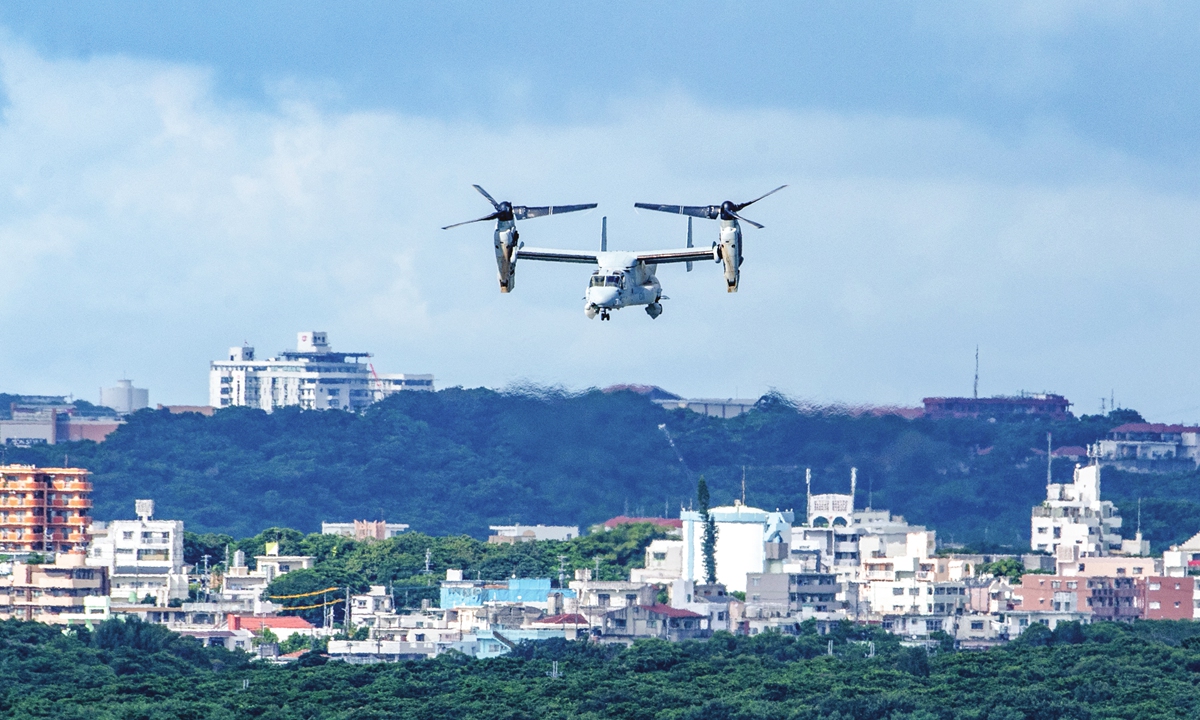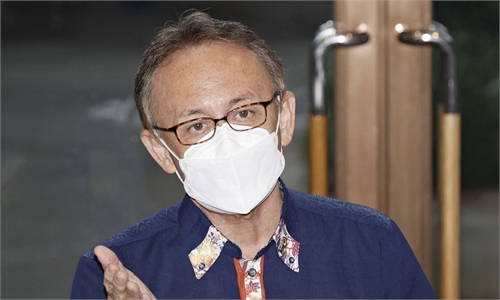
This photo taken on August 23, 2022 shows a US military Osprey aircraft at the US Marine Corps Air Station Futenma in the centre of the city of Ginowan, Okinawa prefecture. Photo: AFP
Editor's Note:The burden of hosting US military bases continues to be a matter of concern for Okinawans, even half a century after its return to Japan. The natives have spent decades protesting the presence of the US military in their daily lives, and one of them is Jinshiro Motoyama (Motoyama), who made headlines for carrying out hunger strikes for the cause. Global Times (GT) reporter Xing Xiaojing talked to Motoyama recently about his activities and the political prospect of Okinawa.
GT: In 2019, you launched a referendum in Okinawa against the US military base in Japan, which was supported by 70 percent of the voters. In May, you launched a hunger strike outside the office of Japanese prime minister. Do you think it has achieved the desired effect? Have your activities posed any threat to you?
Motoyama: In February 2019, as a representative of the civic group "Henoko Okinawan Resident Vote Assembly," I organized a referendum in Okinawa Prefecture on whether to support the relocation of the US Marine Corps Air Station Futenma to the Henoko area. Over 70 percent of the voters expressed opposition to the proposal.
At that time, the Japanese government said it respected the result of the vote, but in fact it continued to promote the relocation plan.
In May, the Japanese government celebrated the 50th anniversary of Okinawa's "return," but that was nothing to celebrate at all. By launching a hunger strike, I raised three demands to the Japanese government: Immediately stop constructing new military bases in the Henoko area of Okinawa Prefecture; close the Futenma Airport in few years; disclose all Japan-US agreements related to the US-Japan Status of Forces Agreement and reconsider them after democratic discussions with the population of the Okinawa Prefecture.
The strike has received widespread attention, and some reporters have asked the chief cabinet secretary and minister of defense about them, but all they received were clichés without direct responses. From this point of view, my demands have not been met. But it has succeeded in promoting the international community's renewed attention and discussion on the Okinawa issue. This made me believe that this event is meaningful.
I have never been threatened in real life, but there has been a lot of slander on the internet. However, I do not care at all. I'm just thinking about what else I can do for Okinawa and for the peace and stability in East Asia.
GT: Japan relies on the US for security, and Okinawa is a stronghold of the US military. Do you think the US troops stationed in Japan has brought a sense of security to the Japanese people?
Motoyama: Over 70 percent of US military bases stationed in Japan are in Okinawa, and the Japanese government has continuously strengthened its military deployments in Okinawa. These are all actions of the Japan-US alliance to confront China. The US-Japan security treaty cannot protect Okinawa and people of Okinawa. The Japanese government hyped that "a Taiwan crisis would be a Japan crisis," and Okinawa has been regarded as a front line by the Japanese government.
I was born in Ginowan, Okinawa in November 1991. Living near the military facilities, I was surrounded by fear all the time. For decades, US troops stationed in Okinawa committed vicious incidents including throwing objects from heights, noise pollution and other crimes, ignoring Japanese laws. They also contaminated the natural environment that Okinawan people depend on with toxic chemicals, including Perfluoroalkyl and Polyfluoroalkyl Substances (PFAS). The human rights of the people of Okinawa have been seriously violated, and they have lived in anxiety for many years - the right to peace is also a human right.
From a security point of view, the Japanese government should reduce or even stop hyping that "a Taiwan crisis would be a Japan crisis," and practically improve relations with neighboring countries through peaceful dialogues. This is to protect the people of Okinawa. Okinawa should not be the front line of war. It should be the frontline of cultural exchanges with China, South Korea, North Korea and other countries.
GT: Denny Tamaki has been reelected as governor of Okinawa Prefecture, which is regarded to represent the "public opinion of Okinawa," as well as the contradictions between the Okinawan people and the Japanese government. Do you think the dissatisfaction of the Okinawan people, or even the Japanese people against the US troops in Japan will change the Japanese government's attitude?
Motoyama: This depends on the Japanese government. Regrettable, it is impossible to have expectations of the Japanese government, which has been turning a deaf ear to the voices of the Okinawan people.
The Okinawan people have expressed their demands in various ways, and have actively sought opportunities to speak out in the international community. Based on such consideration, I participated in the convening of the dialogue on the theme of "Do not let Okinawa become a battlefield" to be held on October 15. I am also currently preparing a speech on Okinawa in London.
GT: The voice about "Ryukyu independence" seems to have increased in recent years. How influential the voice calling for independence in Okinawa is? How do you see the prospect of Okinawa's independence?
Motoyama: In general, people who support "Ryukyu independence" are still a minority in Okinawa, but the Okinawan people's dissatisfaction and distrust toward the Japanese government are indeed increasing day by day. As just mentioned, Denny Tamaki defeating ruling-coalition-backed Atsushi Sakima is a strong proof. This is because the Okinawan people do not believe that the candidates supported by the Japanese government will really be good for Okinawa.


